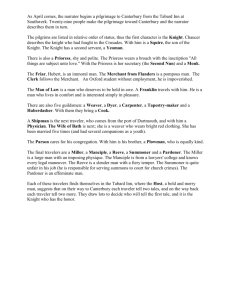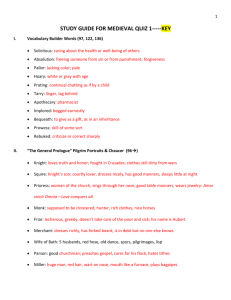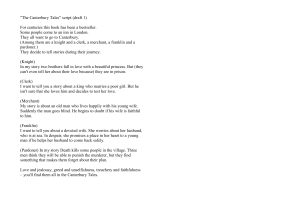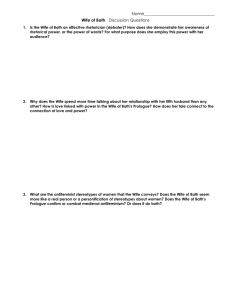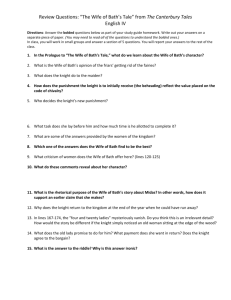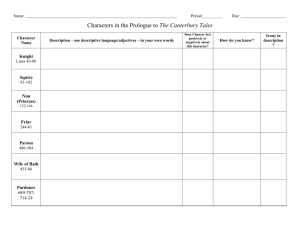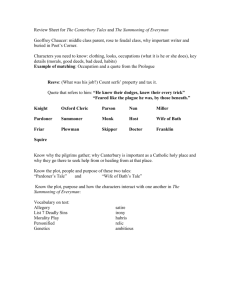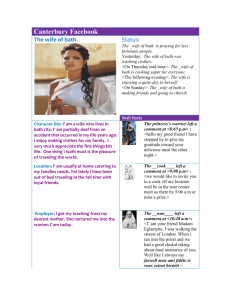Study Questions for Chaucer`s General Prologue to the
advertisement
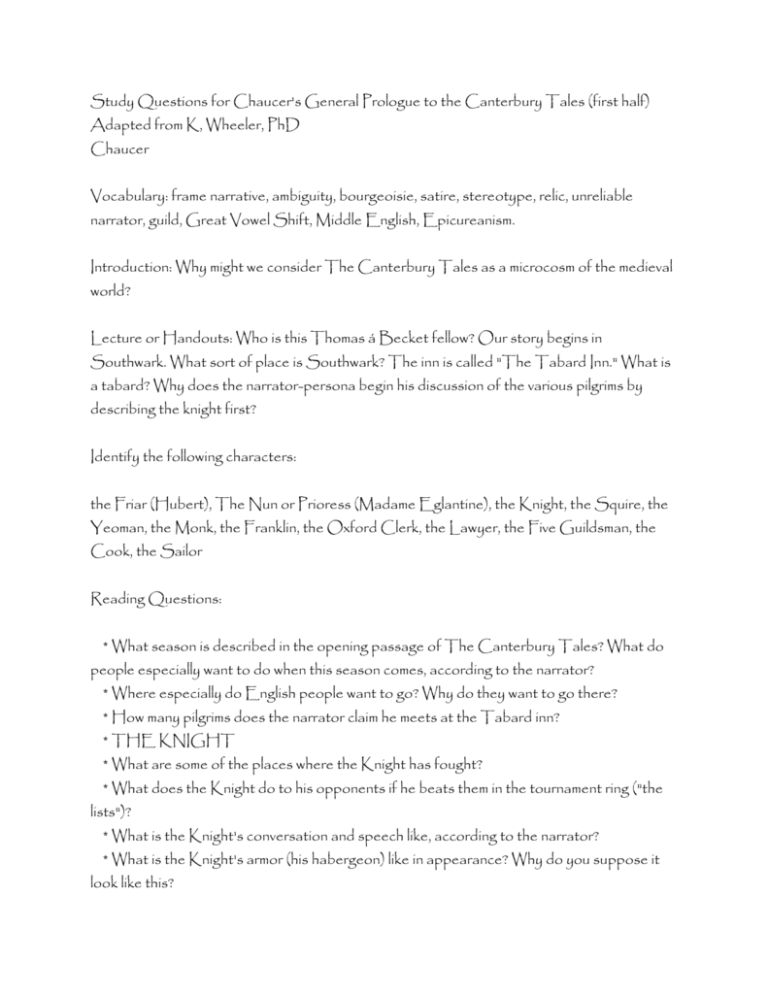
Study Questions for Chaucer's General Prologue to the Canterbury Tales (first half)
Adapted from K, Wheeler, PhD
Chaucer
Vocabulary: frame narrative, ambiguity, bourgeoisie, satire, stereotype, relic, unreliable
narrator, guild, Great Vowel Shift, Middle English, Epicureanism.
Introduction: Why might we consider The Canterbury Tales as a microcosm of the medieval
world?
Lecture or Handouts: Who is this Thomas á Becket fellow? Our story begins in
Southwark. What sort of place is Southwark? The inn is called "The Tabard Inn." What is
a tabard? Why does the narrator-persona begin his discussion of the various pilgrims by
describing the knight first?
Identify the following characters:
the Friar (Hubert), The Nun or Prioress (Madame Eglantine), the Knight, the Squire, the
Yeoman, the Monk, the Franklin, the Oxford Clerk, the Lawyer, the Five Guildsman, the
Cook, the Sailor
Reading Questions:
* What season is described in the opening passage of The Canterbury Tales? What do
people especially want to do when this season comes, according to the narrator?
* Where especially do English people want to go? Why do they want to go there?
* How many pilgrims does the narrator claim he meets at the Tabard inn?
* THE KNIGHT
* What are some of the places where the Knight has fought?
* What does the Knight do to his opponents if he beats them in the tournament ring ("the
lists")?
* What is the Knight's conversation and speech like, according to the narrator?
* What is the Knight's armor (his habergeon) like in appearance? Why do you suppose it
look like this?
* What pilgrim is the son of this Knight?
* THE SQUIRE
* How does the Squire's appearance contrast with that of the Knight?
* How old is the Squire? What talents does he have and how do they contrast with the
Knight? Why does the Squire sleep so little?
* THE YEOMAN
* What's a Yeoman in the medieval world? Why is the Yeoman so sun-tanned? (What does
this trait suggest about him, his activities, and how he spends a time?) Why do you suppose
the Knight would want a servant who is good with a bow?
* THE PRIORESS
* What's a prioress? What is the name of the particular prioress who joins the pilgrimage
company?
* What foreign language does the Prioress speak? Where (according to her accent) did she
learn to speak French? What might this detail reveal about her background?
* How does the Prioress eat her food? What does this detail suggest about her
background?
* What is the Prioress's attitude toward animals? What does this suggest about about her?
* What does her golden brooch have written on it? What are two ways of interpreting this
quotation?
* What four people accompany the prioress?
* THE MONK
* The Monk, we hear, is an "outrider." What is an outrider in a monastery?
* What noise do people hear as the Monk rides past them?
* What is the Monk's attitude toward the Benedictine Rule or the Mauritian Rule (i.e., the
guidelines monks are supposed to obey)?
* What does the Monk think of the argument that holy men shouldn't hunt animals?
* What does the Monk think about studying books?
* What does the Monk think of Saint Augustine's Rule, which requires that monastic
clergy work with their hands at manual labor?
* What animals follow the Monk around when he rides?
* What's unusual about the sleeves of the Monk's habit (robe)? Why does this seem
strange for a monastic habit?
* What sort of pin does the Monk wear in his habit? Why is this pin strange or unusual for a
Monk's clothing?
* THE FRIAR
* What is the Friar's name?
* What does the Friar frequently arrange for young women in his parish? What are two
ways of interpreting this "generosity"?
* What sort of absolution does the Friar grant to sinners?
* What locations does the Friar know especially well in every town? What sort of people
does he know very well?
* We hear that the Friar was particularly of much help on "love-days." What are two ways
of interpreting this phrase, "love-days"?
* THE MERCHANT
* What sort of hat does the Merchant wear?
* What sort of subject does the Merchant always talk about?
* What does the narrator say the Merchant's name is? (Trick question!)
* THE OXFORD CLERK
* What does the word "Clerk" mean in medieval times?
* What does the Clerk of Oxford look like in terms of his physical build? What condition
are his clothes in? What does this suggest about the Clerk?
* What does the Clerk apparently spend all his money on?
* How talkative is the Clerk? When he talks, what traits characterize his speech?
* What two things would the Clerk "gladly" do?
* THE LAWYER
* The lawyer (Sergeant-at-law) is capable of quoting what verbatim? How busy is the
lawyer?
* THE FRANKLIN
* The Franklin is described in particular detail. What is his beard like? What color are his
cheeks? (What modern legendary figure does he resemble from our holiday season?)
* What does it mean when the text reads the Franklin "was Epicurus' very son"? Who was
Epicurus and what is Epicurean philosophy?
* To what saint is the Franklin compared explicitly? Why is this an appropriate
comparison?
* What substances "snow" inside his house?
* THE GUILDSMEN
* The guildsmen--the Haberdasher, the Carpenter, the Weaver, the Dyer, and the Arras
(Tapestry) Maker--all have eating utensils made of the same metal. What metal is this?
[Lecture question: Why are they carrying items of this metal?] What hired help do the
guildsmen bring with them?
* THE COOK
* Who does the Cook apparently work for in the pilgrimage company?
* What does the Cook have on his shin? What does this indicate about the Cook's health
or hygiene?
* What normal color is the sweet blanc-mange the Cook fixes? [Hint: the word "blanc"
provides a clue!] Why is this particularly gross, given earlier details about the Cook's health?
* THE SAILOR
* What town is the sailor possibly from? [Lecture question: What is the area around this
town famous for in the medieval period?]
* What does the Sailor keep on a cord around his neck? What does he keep "under his
arm?" What does he keep hidden under his clothing {i.e., "and down")? Why do you suppose
he keeps three of these items? What does it suggest about what sort of "sailor" this man is?
* What does the Sailor steal while the traders on his boat are asleep?
* If the Sailor gets involved in a naval battle, what does he do with the people he captures,
according to the narrator? What does that mean?
What is the name of his vessel?
Study Questions for Chaucer's General Prologue to the Canterbury Tales (last half)
Vocabulary: the bodily humors, church summoner, pardoner, pardon (or indulgence),
pilgrimage, reeve, relic
Introduction:
Lecture or Handouts: What does the trait of being gap-teethed indicate about a person
according to medieval beliefs about anatomy? Explain the theory of the four bodily humors.
Why was gold valued by medieval physicians? What was the medieval attitude toward widows
and remarriage?
Identify the following characters:
The Doctor of Physick (i.e., the Doctor of Medicine), the Wife of Bath, the Parson, the
Plowman, the Reeve, the Summoner, the Pardoner, the Host (Harry Bailey)
Reading Questions:
* THE PHYSICIAN (DOCTOR OF PHYSIC)
* Why are the stars important for the Doctor of Physick's medical treatments? (i.e., what
"science" of the stars does the Doctor ascribe to?)
* What is this stuff about the "humour" of "hot or cold, of moist or dry"?
* What profitable business arrangement does the Doctor have with "apothecaries"? (What
are apothecaries?)
* What sort of books is the physician well versed in?
* What book does the physician not know very well?
* What material does he like best of all as a "fine cordial"?
* THE WIFE OF BATH
* What physical disability does the Wife of Bath have?
* What does the Wife of Bath wear on her head? How much does this weigh? Why do you
suppose she wears this?
* What color are her stockings?
* How many husbands has she had?
* What are two ways of interpreting that line about "not counting other company in youth"?
* How many times had the Wife of Bath journeyed to Jerusalem? What other places has
she traveled to? What do these wide travels suggest about her as a character?
* What are the Wife of Bath's teeth like?
* What does the Wife wear on her feet/boots to help steer her horse? Why is this unusual
for the period?
* When we hear that, "For of that art she'd learned the old, old dance," what is this old
dance the speaker is referring to, given the context of her knowledge in the previous lines?
* THE PARSON
* According to the narrator, the Parson is hesitant to "curse [his parishioners] to get a
tithe." Instead, what does the Parson do with his own income and goods?
* Why does the narrator note that the Parson's parish was "wide" with "houses far asunder"
before describing the Parson's travels? How does this characterize the Parson?
* What does the Parson do first before he teaches his flock?
* When the Parson asks allegorically, "if gold rust, what shall poor iron do?" what is he
talking about? Who or what is the gold and who or what is the iron?
* When the narrator speaks about a "shitty shepherd, shepherding clean sheep," what is he
talking about?
* Why does the Parson refuse promotion to London or Saint Paul's Cathedral?
* THE PLOWMAN
* To whom is the Plowman related? What sort of work does this Plowman do all day?
* What does the Plowman wear and how does this connect to the early setting of The
Canterbury Tales?
* THE MILLER (ROBIN)
* What's the Miller like in terms of physical build?
* The Miller has an usual party-trick. What technique does he use to remove a door from
its hinges?
* What color is his hair or beard? To what animals does the narrator compare this hair
color?
* What's unusual or disturbing about the Miller's nose?
* We find out the Miller is good at jesting and "poetizing," but what's the only thing he
writes/composes poetry about?
* What does it mean when the speaker says the Miller had a "gold thumb?"
* What unusual musical instrument does the Miller play? According to the last lines of the
portrait, where does he apparently travel in the pilgrimage order?
* THE MANICPLE
* What is a manciple? What apparently is the Manciple's attitude to "learned men" in
comparison to his own wit?
* THE REEVE (OSWALD)
* What does it mean in terms of bodily humors that the Reeve is "choleric"?
* How does the Reeve keep his hair and beard trimmed?
* What is the Reeve's bodily build like, judging by the narrator's description of the Reeve's
legs?
* The narrator states that "Yet no man ever found him in arrears." What are two ways of
interpreting this statement about the Reeve's skills in managing?
* Why are business agents more afraid of the Reeve than they are afraid of death?
* Before Oswald was a Reeve, what job did he have?
* From what region of England does the Reeve come?
* What position does the Reeve always ride in as he travels with the pilgrimage company?
Why do you suppose he rides there?
* THE SUMMONER
* What is a summoner?
* What skin problems does Chaucer's Summoner have?
* What foods does the Summoner like best?
* What is the Summoner's mastery of Latin limited to?
* Why does the narrator think the Summoner is a generous, friendly fellow? (i.e., For what
trade would the Summoner let a person off easily when that person was summoned to court?)
What are two grammatical ways of reading that line about "suffer for a quart of wine, / Some
good fellow to have his concubine"? What two possible antecedents could the pronoun "his"
refer to?
* The text tells us, "Between ourselves, though ,he could pluck a gull." The original Middle
English reads, "ful prively a fynch eek koude he pulle." What does this mean?
* How had the Summoner gained power over all the boys and girls of the diocese?
* The Summoner is making an unusual fashion statement. What does he wear upon his
head, and what does he carry for a buckler (a shield)? How might this be a parody of
scripture? (Check out Ephesians 6:16, a verse some priests required crusaders and pilgrims
to read before going on a pilgrimage or crusade).
* What pilgrim in particular is a buddy to the Summoner and sings love-songs with him?
* THE PARDONER
* What is a pardoner? What is a pardon or indulgence?
* What is the Pardoner's hair like? What is this "Veronica" that the Pardoner has sewed to
his cap?
* What documents are stuffed full into the Pardoner's wallet?
* What does the Pardoner's voice sound like?
* What's unusual about the Pardoner's beard (trick question).
* What does the speaker mean when he states, "I think he [the Pardoner] was a gelding or a
mare"?
* What does the Pardoner claim about the pillow-case he carries?
* What does the Pardoner claim about his bottle filled with pig bones?
* What other fake relics does the Pardoner carry to sell?
* Chaucer's narrator notes that the Pardoner "moste preche . . . To wynne silver." Why do
you suppose the Pardoner seeks to win silver? Why not gold?
* When the narrator finishes listing the 29 pilgrims, what does he apologize about to the
reader in lines 720-746?
* THE HOST (HARRY BAILEY)
* What traits distinguish the host?
* GENERAL PROLOGUE CONTINUED:
* What sport or entertainment does the Host suggest for the pilgrim company?
* Describe the rules of the game the Host establishes. How many stories will each pilgrim
tell on the way to Canterbury? How many stories will each pilgrim tell on the way back to
London?
* What are the two criteria used to determine the best tale? What is the prize the best
storyteller will receive? Where will the winner receive this prize? Who will pay for it?
* Who will judge the contest? According to the Host, if anybody "gainsays" or questions
his rule, what will that person have to do along the journey?
* How does Harry Bailey (the Host) determine the order of the storytellers? Why is it
suspicious that the Knight "happens" to draw first and "happens" to win?
Study Questions for Chaucer's The Wife of Bath's Prologue
Vocabulary: mock sermon, Lollard, heresy, antifeminist literature
Introduction:
Lecture or Handouts: What does the trait of being gap-teethed indicate about a person
according to medieval beliefs about anatomy? What was the medieval attitude toward widows
and remarriage?
Identify the following characters:
The first three husbands
The fourth husband
The Clerk Jankin (the fifth husband)
Reading Questions:
* Which is better, actual experience or scholarly authority, according to the Wife of Bath's
opening lines?
* At what age was the Wife of Bath first married?
* How many husbands has the Wife of Bath had?
* What scriptural evidence from Christ's life was thought to be proof for medieval
Christians that a woman should only be married once in her life? What scriptural evidence
from Christ's life does the Wife of Bath hold up as evidence that a woman could be married
multiple times?
* What, according to the Wife of Bath, is one clear commandment from Genesis that
clearly indicates she should be married?
* What does the Wife's point about "different schools" making diverse perfect students
and "different methods" making workmen perfect? How does this connect to her own
argument?
* What Old Testament figures does the Wife of Bath point to as evidence that various
"righteous men" and "wise men" could have multiple wives?
* What does the Wife of Bath mean when she sasy, "if there were no seed sown, /Virgnity-where then should it be grown?"
* What is the Wife of Bath's counter-argument to celibate clergy who claim that the
genitals are made (1) merely to pee and (2) merely to distinguish men from women?
* Who are some of the characters that interrupt the Wife of Bath as she speaks? (List two
or three of them).
* What were her first three marriages like?
* The Wife of Bath lists several complaints men typically make about women. What are
some of these common complaints? (List two or three.)
* What were the Wife's first three marriages like? What common features were found in
each marriage match?
* What made problems in the Wife of Bath's fourth marrige?
* What did the Wife of Bath do to make her fourth husband loyal?
* What problems did the Wife of Bath have with her fifth husband?
* What revelation does the Wife of Bath have about the tears she cried at husband #4's
funeral?
* What sort of reading material did husband #5 read to her each night before going to bed?
How did the Wife of Bath react to this?
* What is the Wife of Bath's point when she asks "Who painted first the lion, tell me who?"
To what fable is she alluding?
* What did the Wife of Bath do to anger her husband?
* How did she become deaf in one ear?
* What trick did she employ to sucker-punch her husband and knock him back into the
fireplace?
* How did she achieve mastery over the last husband, and what was their marriage like
afterwards?
Study Questions for Chaucer's The Wife of Bath's Tale
Vocabulary: Breton lai, court of love, satire, fairy-tale, court of love, rash boon, incubus
Introduction:
Lecture or Handouts: Who were the Bretons? What is a lay or lai? How is the Wife of
Bath's Tale a story of psychological wish fulfillment? What is an incubus?
Identify the following characters:
* The maiden walking through the corn
* The Lusty Bachelor Knight
* King Arthur
* Queen Gwenevere
* The 24 Dancing Maidens
* The Old Hag
Reading Questions:
* When is this tale set? (i.e., during the mythic reign of what king?)
* According to the Wife of Bath, why can't people see elves any more? What has driven
them out of their natural habitat?
* What does the Wife of Bath mean when she states, "There is no other incubus than he
[the friar]"?
* What happens to the maid riding alone through the corn?
* What crime does the lusty bachelor commit? What is "maidenhead"? [Hint: This does not
mean he decapitated the girl, as some students have mistakenly declared.]
* What is the initial punishment King Arthur orders for the knight? Who intervenes and
requests a special trial?
* Who is in charge of this special trial for the rapist knight?
* What must the knight do to save his head (i.e., what mission does the court give him)?
* How long does the Knight have to fulfill this mission? How is this similar or different than
the time alloted to Sir Gawain in Sir Gawain and the Green Knight?
* What problem does the Knight find when he starts asking women what the want?
* Which of the following items listed is NOT a response given by women when he asks
them the question?
o Riches,
o Fame,
o Prettiness,
o Rich Array (fine clothes),
o Lust Abed (pleasure in bed),
o Widowhood,
o Re-marriage,
o Flattery,
o Attentions (attentiveness),
o Leisure from work,
o Being free to do what they want,
o Being held constant and trustworthy
* What strange sight does the knight see while riding through the forest on his return
journey?
* What do the twenty-four women do or what happens to them as the knight approaches?
* What does the Old Hag say she wants in return for providing the answer to the knight's
riddle? (Hint: She doesn't tell the knight she wants to marry him.)
* What is the Queen and the court's reaction to the knight's answer?
* What are the wedding celebrations like when the knight marries the hag? (trick question!)
* What does the hag teach the young knight about nobility in her lecture? What makes a
person "noble" or "gentle" according to her?
* What defense does the hag provide for her poverty and her ugliness? Why are these
advantages, according to her?
* What two options does the hag present to the knight?
* Which of these two options does the knight pick (trick question!)
* How does the hag's appearance change at the end of the story?
Food for thought: How does the Tale of the Wife of Bath connect to her message in her
prologue? How does the Tale connect to the portrait of the Wife in the General Prologue?
How might her story be a type of wish-fulfillment for the aging? How does the Hag's
transformation externally match or mirror an internal transformation of the rapist knight who
earlier gave no respect to women's wishes
